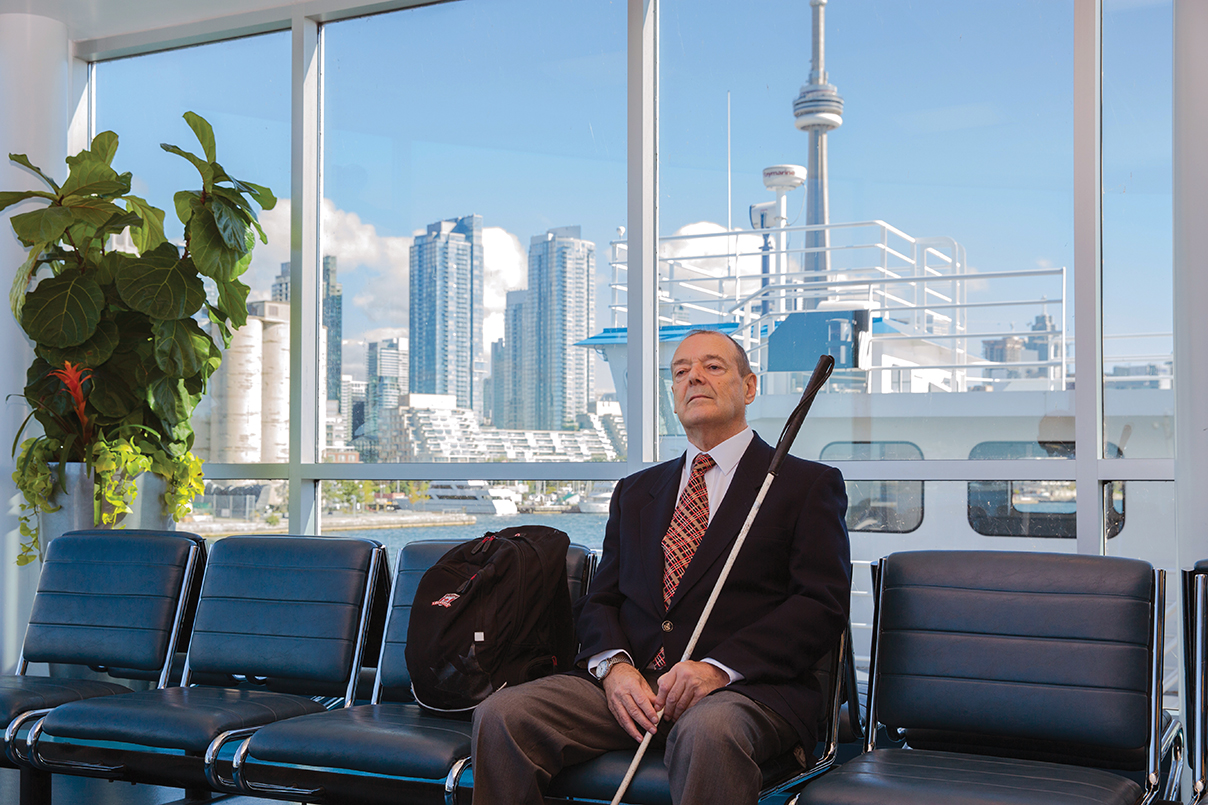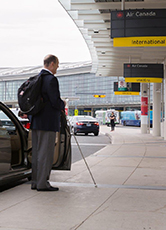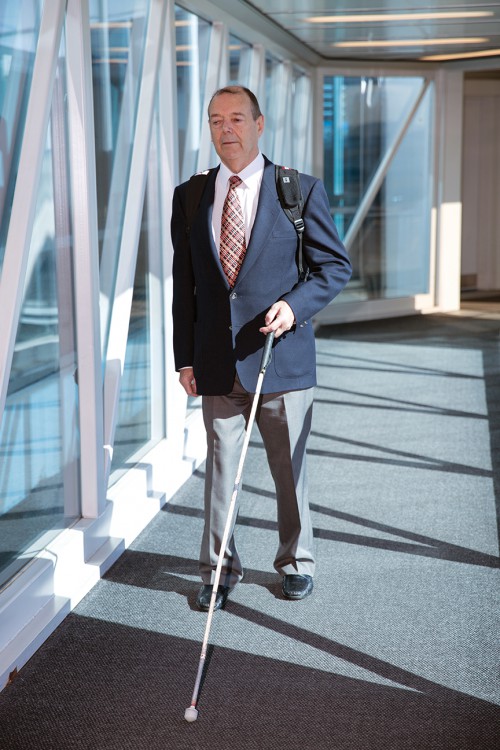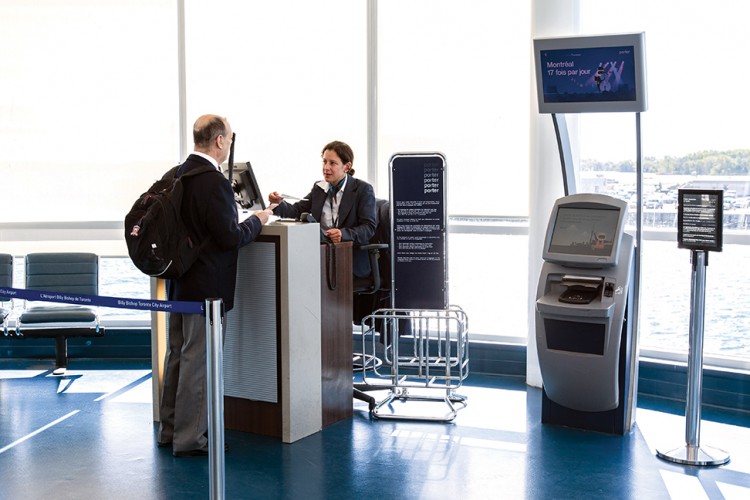The Sky’s the Limit
For Frequent Flyer Michael Westmore
By Tracey Coveart

WESTMORE doesn’t take in the view as he flies high above the Atlantic Ocean, returning by plane to a small island south of England from his home in Toronto. It’s a business trip he has made three or four times each year for more than two decades, and he knows the journey like the raised veins on the back of his hand. He doesn’t watch the inflight movie or read the magazines tucked into the pocket of the seat in front of him. He doesn’t use the computer stowed away safely in his backpack. Instead, he concentrates on the tasks at hand: the meal in front of him; the occasional trip to the restroom; the chance to stretch his legs.
At 71, Westmore retains an enthusiasm for travel and an adventurous spirit, two remarkable qualities in any senior, which are made all the more extraordinary by the fact that this frequent flyer is blind. Westmore was diagnosed with glaucoma when he was 28 years old. His sight slipped away gradually over the next 33 years, until he went completely blind at the age of 61.
Westmore began his working life at a shipyard, but eventually moved into sales and marketing, first with a commercial wall covering business, then with a stationery firm. He retired as the UK director of an international property company. His international travelling days began when he fell in love with Canada. He still retained some vision at this point, and was a seasoned transatlantic traveller by the time he went completely blind.
A TALE OF TWO COUNTRIES
Travelling is not a luxury for Westmore, who has applied for residency in Canada. He must return to his permanent home in the Isle of Wight every three months to retain his status as a tourist in this country until he is granted citizenship. Making the regular journey without sight is simply another workaround that is required to sustain his dual life.
It was on a trip to visit friends in 1985 that Westmore fell in love with Canada. He has been coming back to this country ever since, spending eight months of the year in Toronto—punctuated by month-long mandatory visits to his native England— since retiring 12 years ago.
“I have a home here, near Maple Leaf Gardens, and a small cottage on the Isle of Wight,” says Westmore. Never married, he lives independently and alone in both countries, navigating his two houses and two communities with minimal assistance. “I need someone to help me clean the house and do laundry, but I do everything else on my own.”

SLOW DESCENT INTO DARKNESS
It hasn’t been easy to navigate a pitch-black world, but Michael had the dubious benefit of losing his sight gradually. “There were no instant changes. I was able to adapt as I progressed through life and vision loss. In every way I’ve adjusted gradually.” And while he is still learning, “most of the major mistakes I would have made were ironed out over the years before I went totally blind. After banging your head 25 times, you learn to close the cupboard doors.” The keys to his independence are routine, simplification, organization and discipline: a place for everything and everything in its place.
“I learned the routines when I had sight, although I was much less organized. As a blind person, you have to be so much more disciplined than a sighted person in every aspect of life. You have to put things back where they came from. You go to the cupboard, find what you’re looking for, use it, put it back and close the cupboard door. And that process applies to everything.”
Spontaneity is a problem. “You’re concentrating, the phone rings, you drop what you’re doing, get distracted by your conversation, then come back and have to retrace your steps to start where you left off,” he says. “That’s not as much of a priority for sighted people. If they put something down to go and do something else, they just look around until they see where they put it. I can search for hours to find what I’ve misplaced, or have to wait until someone with sight comes to the house.
Just about the only thing Westmore doesn’t do by computer is make his travel arrangements. “It’s too dangerous. If I press one wrong key, I could easily purchase a ticket to Kuala Lumpur!” Instead, he uses a travel agent.
Over the years, discipline has become my guiding principle.”
In 1997, Westmore was given the opportunity to learn Braille or to learn how to use a computer. “I had never operated a computer before, but I thought it would be much more advantageous. It was the best thing I ever did. My computer is the most important thing in my life,” says Westmore.
“It keeps me in touch with everything. I would be lost without it.” He can’t see the screen, but he knows his way around a keyboard thanks to a touch-typing course offered by the CNIB, and an auditory software program called Dolphin Guide, which was developed in the UK, “speaks to me and reads me my e-mail messages.”

UP, UP AND AWAY
Just about the only thing Westmore doesn’t do by computer is make his travel arrangements. “It’s too dangerous. If I press one wrong key, I could easily purchase a ticket to Kuala Lumpur!” Instead, he uses a travel agent.
And although round-trip tickets “are generally cheaper to buy in Canada, I make my bookings in the UK because I am currently a British resident. When I arrive at Pearson International Airport, one of the questions I always have to answer is how long I am planning to stay in Canada.”
He was unable to answer that question only once. “I booked a round-trip ticket originating in Canada. When I returned from England, the immigration officials were not happy that I was arriving here without a definite departure date.” Mistake made. Lesson learned. Move on.
Westmore has been using the same travel agency since 1990. “They know what I need to get from A to B,” which includes special assistance from airline staff. He also uses the same UK cab company. Friends transport him to the hovercraft on the Isle of Wight, which makes the five-minute crossing to the mainland. “The cab company sends a driver who knows me, and he takes me to Heathrow and deposits me with the airline staff. The staff takes me to the desk to check in, through the airport to security, to the departure lounge, onto the aircraft and to my seat.
“The flight attendants are aware that I’m blind and they offer me the most wonderful service,” which includes an individual safety briefing before takeoff. (Braille and large-print safety cards for passengers who are blind or have a visual impairment are also offered.)
When he lands in Toronto, the whole process occurs in reverse. “They take me off the aircraft and hand me over to the various sections, including Customs and Immigration. Then someone takes me out of the airport and puts me into a limousine that brings me here to my home.”
All major airlines offer services for travellers with special needs at no extra, but Westmore prefers to fly with the company he has come to trust over the years. “Air Canada is exceptionally good at handling people who are blind, and I feel very comfortable travelling with them. In response I feel I owe them a little loyalty.” Although he requires “a little help now and again, I’ve done it so often it’s virtually seamless.” Familiarity certainly helps. So does the standardization of things like restrooms and meals. “Most people wouldn’t even realize it, but every item on your tray has a fixed position: The main dish is directly in front, the cup is on the right, the starter and dessert are on the left, and the cutlery is in the middle. These things are uniform on every flight.”
FLYING SOLO
What makes Westmore a bit of an anomaly among passengers with special needs is that he travels alone. “Most people I know with disabilities prefer to travel with a companion—a person they know who will assume responsibility for their requirements and guide them—but I’ve always been on my own.” This self-reliance, ironically, has resulted in the need for him to put his trust in strangers.
“Wherever I go—in a taxi, on an airplane, in a shop—I have to give my trust to others. And that gives me a wonderful feeling about this world. I can honestly say that I have never met anyone who has tried to take advantage of me.” As a result, “I’ve never been afraid of travelling,” says Westmore.
“I have to give my trust to others. And that gives me a wonderful feeling about this world. In fact, I can’t get going quickly enough. It’s part of who I am. I’m enthusiastic and forward thinking, and that keeps me in good stead. From the moment I set off to the moment I arrive, I just think, ‘I’m on my way!’”
But while he’s always up for an adventure, Westmore doesn’t take unnecessary risks or put himself in situations that could be disorienting and potentially dangerous. “I try to operate to the extreme of my abilities, without being foolish; to test myself within the confines of my own capacity.”
FUTURE FLYER
Once Westmore becomes a Canadian citizen, he will live his life in reverse. “I will reside here in Toronto and sell my cottage, visiting the Isle of Wight—where I was born—maybe once a year, staying with friends or taking a hotel.” Future travel is definitely on the books, as long as airlines continue to open their wings for passengers with disabilities.
The one drawback to the special service he receives? “As a traveller requiring assistance I am put onto the aircraft first, but at the end of the flight I am asked to remain seated until the other passengers have disembarked. It usually adds another 25 minutes to the journey—and all I want to do is get up and go!”
Tracey Coveart is a writer, editor and mother of three. She has a daughter with autism, global developmental delay and epilepsy.

WESTMORE’S TRAVEL TIPS
The keys to a successful trip—and to a successful life as a person who is blind, says Westmore—are simplification, organization, discipline and routine. The following are a few tips he has put together for other travellers with special needs.
1. Use a travel agent. “Because I’m blind, I only have to hit one wrong key when I’m booking my ticket for everything to fall apart. I trust the system but I don’t trust myself.”
2. Stick to your normal routines. “With money, for instance, I always ask the bank teller for twenties. I have one pocket for twenties, one for tens and one for fives. I keep loonies and toonies in one pocket and smaller coins in another. I try not to get distracted or feel rushed and just start throwing change into any pocket.”
3. Have total faith in your carrier. “This is something that comes with experience. Find out which airline works best for you. In the main, I use Air Canada, because I know how they’ve treated me in the
past and I trust their service.”
4. Eliminate problems in advance. “Even though I’m blind, I’m treated exactly the same as any other airline passenger. I’m subject to a bag search, and I have to pass through the metal detectors. I make sure not to pack metal objects (such as a nail file) and liquids in excess of allowable limits in my carry-on luggage.”
5. Make your own fun. “Being on the plane is the dullest seven and a half hours of my life. Because I can’t watch the inflight movie, I bring talking books and a portable CD player.”
6. Travel light. “I usually fly with just a backpack because I have clothes in both my homes. I only pack incidentals, plus my computer, which goes with me everywhere. If I do have to check a bag, it has to be retrieved when I reach my destination, which can add as much as an hour to my journey.”
7. Try not to worry. “I look at the advantages rather than disadvantages of everything. I know I will make mistakes, but I also know those mistakes can be corrected. It’s easier to accept that problems will arise from time to time and not worry about them than to dwell on what could go wrong. If I thought like that, I’d never go anywhere.”
8. Don’t try to hide your disability. “I’m told that I don’t look blind, so I always carry my cane. Not only is it an invaluable aid for finding my way around, it’s also an indication to the general public that I cannot see.”
9. Be gracious and grateful. “If someone offers me help, I accept it and am thankful for it—even if I don’t really need it—because
in the future it might help another person who’s blind. If I refuse help, then that person might not offer help to the next person who is blind he sees. And that person might need it.”
10. Trust others, and don’t be afraid to ask for assistance. “If you do lose track of what money is where, ask someone for help identifying your bills. I’ve always been a trusting person, but because of my circumstances I’ve had to give my trust to people I might not normally have trusted if I had full sight.”
11. Know what you have and where it is. “My keys, for example. I always keep my front door keys on a chain that is attached to my belt.”
12. Just do it. “Travelling is a wonderful experience. In addition, if you do it—and you’re successful at doing it—it will give you confidence in other areas of your life.”
AIRLINE ACCOMMODATIONS FOR PASSENGERS WITH SPECIAL NEEDS
Most major airlines, including Air Canada and WestJet , maintain a medical assistance desk and offer special services to travellers with medical conditions and physical, intellectual and emotional disabilities.
Special services are available for passengers who:
- require wheelchair or mobility aid assistance
- need special or additional seating n must travel with an attendant or service animal
- have a visual or hearing impairment n require oxygen for travel
- suffer from allergies
While there is no extra charge associated with these special services, airlines do require advance notice and medical documentation, including proof of medical condition or disability and medical approval for travel. Passengers with special needs may also be required to arrive at the airport in advance of the recommended check-in time, and should be aware that there may be a limited number of guests with special needs that can be accommodated on any one flight.
TELL US YOUR TRAVEL STORIES
Want to share your experiences and tips with others? Contact us at: bianca@bcsgroup.com














